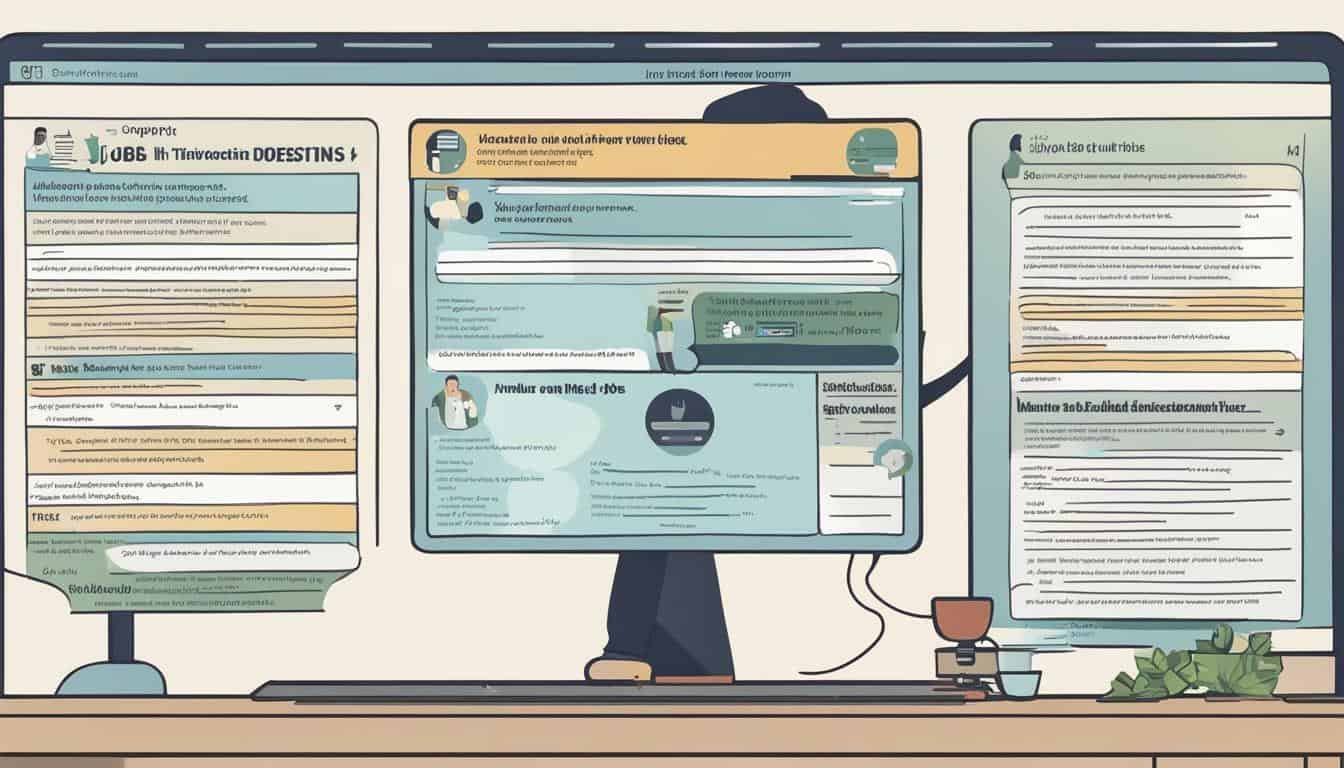Are you looking for a career that offers high earning potential and job satisfaction? Look no further than the IT industry! With a range of well-paying job opportunities available, a career in IT can provide the financial stability and professional fulfillment you crave.
But what makes an IT job lucrative? The answer lies in the in-demand skills, job roles, and industries that offer top salaries and career growth. In this article, we’ll explore everything you need to know about good paying IT jobs, from understanding the industry landscape to negotiating salaries and building professional connections.
Key Takeaways:
- The IT industry offers a range of lucrative career opportunities.
- In-demand IT skills can open doors to high-paying job roles.
- Certifications and specializations can lead to career advancement and increased earning potential.
- The right networking strategies and negotiation skills can help you secure the best salary offers.
- The future of the IT industry holds exciting new technologies and trends that will create even more opportunities for good paying jobs.
Understanding the IT Industry Landscape
If you’re considering a career in IT, it’s essential to understand the industry landscape. The IT industry, also known as the tech industry, encompasses a broad range of roles and career paths. From software development and data analysis to cybersecurity and project management, there are countless opportunities to explore.
One of the most significant advantages of pursuing a career in IT is the job security. As technology continues to advance and permeate virtually every industry, the demand for IT professionals only continues to grow. This trend is unlikely to change in the foreseeable future, making IT jobs a safe bet for long-term career growth and stability.
Another advantage of an IT career is the potential for high-paying jobs. Many IT jobs offer competitive salaries and excellent benefits packages, making them desirable choices for professionals looking to earn a good income.
However, the IT industry can be highly competitive, with many qualified candidates vying for the same positions. It’s essential to research the industry and identify the skills and experience required to succeed.
In-Demand IT Skills for Lucrative Careers
Acquiring and continuously developing your IT skills is critical for landing and succeeding in high-paying IT jobs. As technology rapidly evolves, certain skills become more valuable and in-demand. Employers are constantly seeking IT professionals with the right skills to solve complex problems and drive innovation in their organizations.
Here are some of the key in-demand IT skills that can lead to lucrative careers:
- Data analytics: With the increasing reliance on data in business decision-making, professionals with skills in data analytics, data science, and big data are in high demand. Companies require individuals who can collect, process, and analyze large amounts of data to uncover valuable insights and make informed decisions.
- Cloud computing: Many organizations are moving their IT infrastructure to the cloud for improved scalability, flexibility, and cost-effectiveness. Professionals with skills in cloud computing, including cloud architecture, migration, and management, are important resources in this transition.
- Cybersecurity: As cyber threats become more sophisticated and frequent, there is a growing need for IT professionals with cybersecurity expertise. This includes skills in securing networks, detecting and responding to cyber incidents, and implementing security controls to protect against attacks.
- Software development: IT professionals with skills in software development, including coding languages such as Java, Python, and Ruby, are highly sought after for their ability to develop and maintain complex software systems that power businesses.
- Artificial intelligence and machine learning: With the increasing adoption of artificial intelligence (AI) and machine learning (ML) in industries such as healthcare, finance, and retail, IT professionals with skills in these areas are in high demand. This includes expertise in data modeling, algorithm development, and natural language processing.
Acquiring and mastering these in-demand IT skills can open up a world of lucrative career opportunities in various industries. As the IT industry continues to evolve, staying up-to-date with the latest trends and technologies is essential to remain competitive in the job market.
Top Paying IT Job Roles and Salaries
IT industry is one of the highest paying industries, and if you’re wondering which IT jobs pay the most, we’ve got you covered. Here are the top paying IT job roles that offer some of the highest salaries in the industry:
| Job Role | Average Salary (per year) |
|---|---|
| Enterprise Architect | $144,000 |
| Software Engineering Manager | $137,000 |
| Software Development Manager | $134,000 |
| Data Warehouse Manager | $129,000 |
| Applications Development Manager | $128,000 |
| IT Program Manager | $127,000 |
| Data Architect | $120,000 |
| Security Architect | $119,000 |
As you can see, the salaries associated with these job roles are quite impressive. With the right skills and experience, you can aim for these top-paying positions and secure a high salary in the IT industry.
However, it is important to note that salaries may vary based on factors like location, industry, and company size. It’s always a good idea to research salaries in your area and industry to get an accurate idea of what you can expect to earn.
Best Paying Industries for IT Jobs
While the salaries for IT jobs can vary across different industries, there are some sectors that offer higher earning potential than others. Here are some of the best-paying industries for IT jobs:
- Finance and Banking
- Healthcare and Pharmaceuticals
- IT and Software Services
- Telecommunications
- Government
- Energy and Utilities
If you’re interested in pursuing a lucrative career in the IT industry, it’s worth considering the above sectors and researching the job opportunities available.
With the right skills, certifications, and experience, you can secure a high-paying job in the IT industry and enjoy a rewarding career. So, don’t wait any longer, start exploring the top-paying IT job roles and industries today!
Navigating the IT Job Market: Tips and Strategies
The IT industry boasts a wealth of high-paying job opportunities, but navigating the job market can be challenging. To give yourself the best chance of landing your dream role, it’s essential to develop strong job search strategies and stand out from the crowd. Here are some tips for navigating the IT job market:
1. Define Your Goals
Before starting your job search, it’s essential to define your goals and understand the type of role you’re looking for. Are you interested in a specific industry or sector? Do you have a particular skill set you want to utilize? By identifying your career goals, you can focus your job search efforts and tailor your applications to the most relevant opportunities.
2. Utilize Job Boards and Recruitment Agencies
Job boards and recruitment agencies can be great resources for finding IT job opportunities. Sites like Indeed, Glassdoor, and Monster offer job listings for a wide range of roles and companies, while recruitment agencies can connect you with specialized and high-paying roles that may not be advertised publicly.
3. Network with Other IT Professionals
Networking is crucial in the IT industry, as many job opportunities are filled through referrals and connections. Attend industry events and meetups, join IT associations, and stay active on professional networking sites like LinkedIn. Building a strong network can lead to valuable job referrals and open doors to new career opportunities.
4. Customize Your Applications
When applying for IT roles, it’s essential to customize your applications to the specific job and company. Tailor your resume and cover letter to highlight your relevant skills and experience, and research the company to ensure you understand their values and mission.
5. Make an Impression in Interviews
Once you land an interview, it’s time to make an impression. Prepare for common interview questions and showcase your enthusiasm for the role. Research the company and come with questions to show your interest and engagement.
6. Consider Contract or Freelance Work
Contract or freelance work can be a great way to get your foot in the door and build your skills and experience in the IT industry. These roles can often lead to full-time employment and offer competitive pay.
By implementing these job search strategies and standing out from the crowd, you can navigate the competitive IT job market and land a high-paying role that aligns with your career goals.
Advancing Your IT Career: Certifications and Specializations
If you want to boost your earning potential and advance your career in the IT industry, acquiring certifications and specializations is crucial. These additional qualifications demonstrate your expertise and commitment to continuous learning, setting you apart from other candidates in a competitive job market.
IT Certifications
IT certifications are industry-recognized credentials that validate your technical knowledge and skills. By earning certifications, you demonstrate your proficiency in specific technologies and tools, which can lead to higher-paying job opportunities. Some popular IT certifications include:
| Certification | Description |
|---|---|
| CompTIA A+ | A foundational certification that validates your understanding of hardware, software, networking, and security. |
| Cisco Certified Network Associate (CCNA) | A well-respected certification that verifies your ability to install, configure, and troubleshoot Cisco networking equipment. |
| Microsoft Certified Solutions Expert (MCSE) | A certification that demonstrates your expertise in Microsoft technologies, such as Windows Server and Azure cloud services. |
Obtaining IT certifications can be challenging, but there are many resources available to help you prepare for exams, such as online courses, study guides, and practice tests.
Career Advancement
Acquiring certifications can also lead to career advancement opportunities, including promotions and salary increases. With specialized knowledge and skills, you may be able to move into leadership roles, such as IT manager or chief technology officer. In addition, companies may be willing to invest in your professional development, covering the costs of certifications and training programs.
IT Specializations
In addition to certifications, pursuing IT specializations can also be beneficial for your career. Specializations allow you to deepen your expertise in specific areas of IT, which can make you more valuable to organizations that require these skills. Some popular IT specializations include:
- Data science
- Cybersecurity
- Cloud computing
- Artificial intelligence
By focusing on a specific area of IT, you can become an expert in your field and command higher salaries. In addition, you may be able to work on exciting and innovative projects that align with your interests and passions.
Overall, obtaining certifications and specializations can help you stay competitive in the IT industry and open up new opportunities for career advancement and increased earning potential.
Exploring Lucrative IT Industries
When it comes to finding high-paying IT jobs, certain industries and sectors offer greater earning potential than others. By exploring these lucrative IT industries, you can gain valuable insights and determine where you may want to focus your job search.
| Industry | Average Salary |
|---|---|
| Finance and Banking | $100,000 – $150,000+ |
| Healthcare | $90,000 – $130,000+ |
| E-commerce and Retail | $80,000 – $120,000+ |
| Government and Public Sector | $80,000 – $120,000+ |
| Telecommunications | $70,000 – $110,000+ |
These are just a few examples of the high paying sectors within the IT industry. By researching the different industries and understanding their salaries, you can target your job search and increase your chances of landing a well-paying position.
It’s important to note that salary ranges can vary based on location, company size, and years of experience. However, these industries are known to offer some of the most lucrative IT roles with great potential for growth and advancement.
When pursuing a career in a particular industry, it’s also important to consider factors beyond the salary. Look for companies and industries that align with your values and interests, offer opportunities for professional development, and provide a healthy work-life balance.
Balancing Work-Life in High-Paying IT Jobs
Working in the IT industry can be both rewarding and challenging, especially when it comes to balancing work-life. With demanding deadlines, complex projects, and constantly evolving technologies, IT professionals are susceptible to high levels of stress. However, maintaining a healthy work-life balance is vital for career satisfaction and overall well-being. Here are some tips for achieving work-life balance in high-paying IT jobs:
- Set boundaries: Establish clear boundaries between work and personal time. Avoid bringing work home with you, and try to disconnect from technology during non-work hours.
- Exercise: Incorporate regular exercise into your routine, as it can reduce stress levels and increase energy. Take advantage of lunch breaks to go for a walk or hit the gym.
- Take breaks: It’s important to take breaks throughout the day, especially if you spend a lot of time sitting at a desk. Use the Pomodoro technique to break up work into manageable intervals with short breaks in between.
- Practice mindfulness: Mindfulness practices, such as meditation or deep breathing, can help reduce stress and improve focus. Try incorporating mindfulness into your daily routine, even for just a few minutes.
- Communicate: If you are feeling overwhelmed or stressed, don’t hesitate to communicate with your supervisor or colleagues. They may be able to help ease your workload or provide support.
- Get enough sleep: Sleep is crucial for both physical and mental health. Aim for 7-8 hours of sleep each night to help manage stress and maintain focus.
Remember, achieving work-life balance is essential for long-term career success and overall well-being. By implementing these tips, you can reduce IT job stress and increase career satisfaction.
Negotiating Salaries: Getting What You Deserve
When you receive an IT job offer, it’s crucial to take the time to negotiate your salary. Many people are hesitant to negotiate, fearing that they may jeopardize the offer altogether. However, negotiating your salary is an essential part of ensuring that you are compensated fairly for your skills and experience.
Remember, the initial job offer is just that – an offer. You have the power to negotiate, and the employer expects you to do so. If they are interested in hiring you, they want to work with you to find a mutually agreeable salary.
It’s important to research the average salary for your position and level of experience in your region. Websites like Glassdoor and Payscale can provide valuable insights into industry standards. Use this information to inform your negotiation and determine a reasonable salary range.
When negotiating, be confident and assertive. Explain why you believe you deserve a higher salary, highlighting your skills and accomplishments. You can also negotiate other benefits, such as flexible working hours, additional vacation time, or a signing bonus.
Remember, the goal is not to get the highest salary possible but to receive fair compensation for your skills and experience. Be flexible and open to negotiations, but do not settle for less than you deserve. With proper research and preparation, you can negotiate a salary that reflects your true value and sets you on the path to achieving your earning potential in the IT industry.
The Future of Good Paying IT Jobs
As the IT industry continues to grow and evolve, new technologies and trends will shape the future of good paying IT jobs. It is crucial for IT professionals to stay up-to-date with the latest developments and acquire the necessary skills to adapt to these changes.
Emerging Technologies
One of the most significant trends in the IT industry is the rise of emerging technologies such as artificial intelligence (AI), machine learning, and blockchain. These technologies have the potential to revolutionize various industries, creating new job opportunities for IT professionals.
For instance, AI and machine learning will lead to increased demand for data scientists and developers who can analyze and interpret large volumes of data. Similarly, blockchain technology is expected to create new job positions for developers and security professionals who can implement and secure blockchain networks.
IT Career Trends
Another key trend in the IT industry is the shift towards cloud computing and remote work. As more companies adopt cloud-based solutions, the demand for cloud architects and engineers will continue to rise. Similarly, remote work is becoming increasingly popular, creating new opportunities for IT professionals who can manage and secure remote networks.
Additionally, cybersecurity remains a top concern for businesses, leading to a growing demand for security professionals who can safeguard information and systems from cyber threats.
Continuous Learning and Professional Development
With the rapid pace of technological change in the IT industry, it is essential for professionals to prioritize continuous learning and professional development. By staying up-to-date with the latest technologies and trends, you can position yourself for success and capitalize on new job opportunities.
There are various ways to stay ahead of the curve, including attending conferences, earning industry certifications, and engaging in online learning. By investing in yourself and your skills, you can ensure a bright future in the constantly evolving world of IT.
Networking and Building Professional Relationships
Networking is a crucial part of any successful career, and the IT industry is no exception. Building relationships with other professionals in your field can open doors to new job opportunities and help you stay up-to-date with industry trends and best practices. Joining IT associations and attending industry events are great ways to expand your network and meet other professionals in your field who may be able to offer valuable guidance or connections.
One of the most important aspects of networking is building genuine relationships with others. When you meet someone new, take the time to get to know them and learn about their interests and goals. Offer to grab coffee or lunch and follow up with them periodically to maintain the relationship. Remember to always be respectful and professional, as maintaining a positive reputation is key to building a strong network.
| Networking Tips: |
|---|
| Attend industry events: Conference, job fairs, and other industry events are great opportunities to meet new people and connect with other professionals in your field. |
| Join IT associations: Joining an IT association can provide access to a wealth of resources and networking opportunities. |
| Use social media: Platforms like LinkedIn can be great for making professional connections and staying in touch with others in your field. |
| Offer value: When building relationships, focus on how you can offer value to the other person. This can mean sharing your expertise, offering to make an introduction, or simply being a good listener. |
Remember, networking is a two-way street. Be sure to offer value to others in your network as well, such as providing referrals or sharing opportunities you come across. By building strong relationships within your industry, you can set yourself up for long-term success in your career.
Conclusion
Congratulations on taking the first step towards landing your dream career in the IT industry! As you now know, pursuing good paying IT jobs can lead to a successful and prosperous career. Remember to keep the following tips and strategies in mind:
- Understand the IT industry landscape and the potential for high-paying jobs.
- Acquire in-demand IT skills and explore certifications and specializations for career advancement.
- Explore the top paying IT job roles and salaries to discover your earning potential.
- Navigate the IT job market with practical tips and strategies, and don’t forget to network and build professional relationships.
- Balance work-life in high-paying IT jobs to ensure career satisfaction and overall well-being.
- Stay up-to-date on emerging technologies and IT career trends to stay ahead of the game.
- Advocate for your worth and negotiate salaries to maximize your earning potential.
With these tips and strategies in your arsenal, you’ll be well on your way to discovering the best paying IT jobs and achieving your career goals. Good luck!
What Are Some High-Paying IT Jobs That I Can Explore for My Dream Career?
If you have aspirations for a high-paying career in the IT field, there are several lucrative positions you can explore. Some of the top-paying IT jobs include software engineer, data scientist, cybersecurity analyst, and cloud architect. These roles offer attractive salaries and excellent growth opportunities. If you are passionate about technology and seeking a prosperous career, explore it jobs now to find your dream position.
FAQ
Q: What are good paying IT jobs?
A: Good paying IT jobs are high salary positions in the IT industry that offer competitive compensation and benefits.
Q: What types of IT careers have high salaries?
A: IT careers such as software engineering, data science, cybersecurity, and cloud computing are known to have high salaries.
Q: How can I land a well-paying IT job?
A: To land a well-paying IT job, it is important to acquire in-demand IT skills, gain relevant experience, and showcase your expertise through certifications and specializations.
Q: What is the earning potential in the IT industry?
A: The earning potential in the IT industry can vary depending on the job role, experience, and location. However, many IT professionals have the opportunity to earn a lucrative income.
Q: Are there specific industries within IT that offer high paying jobs?
A: Yes, there are certain industries within IT, such as finance, healthcare, and technology consulting, that are known to offer high paying job opportunities.
Q: How can I negotiate a higher salary in the IT industry?
A: To negotiate a higher salary in the IT industry, it is important to research salary ranges for your role, showcase your skills and experience, and confidently communicate your value to potential employers.
Q: What is the future of good paying IT jobs?
A: The future of good paying IT jobs is promising, with emerging technologies such as artificial intelligence, machine learning, and cybersecurity creating new opportunities for lucrative careers.
Q: How can networking help in finding high-paying IT jobs?
A: Networking can help in finding high-paying IT jobs by providing access to job referrals, industry connections, and keeping up-to-date with the latest opportunities in the field.
Q: How important is work-life balance in high-paying IT jobs?
A: Work-life balance is important in high-paying IT jobs to ensure career satisfaction, prevent burnout, and maintain a healthy overall well-being.
Q: Why is it important to acquire IT certifications and specializations?
A: Acquiring IT certifications and specializations can demonstrate your expertise, enhance your skills, and increase your earning potential in the IT industry.




0 Comments